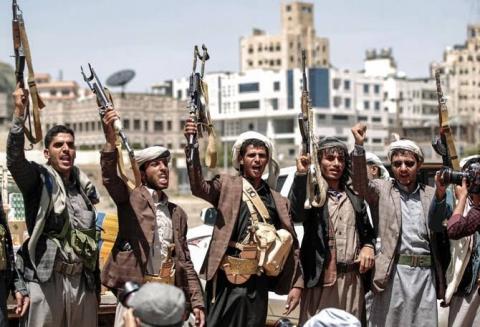New escalation in Yemen


Military escalation continues to prevail over peacemaking efforts in Yemen, with Arab Coalition air forces striking strategic targets controlled by Ansarullah (Houthi) forces in the Yemeni capital Sanaa this week.
A coalition communique said that the strikes had targeted the airport, which had been converted into a military base for advisers from the Iranian Revolutionary Guard Corps (IRGC) and the Lebanese Hizbullah group. According to the statement, the Houthis had used legally immune locations to launch cross-border strikes into Saudi Arabia.
The coalition’s escalation, the first in a long time, was a response to Houthi attacks that had failed to distinguish between military and civilian targets, such as the drone strikes against the Abha Airport and repeated missile strikes against residential areas and even refugee camps in Marib, the statement said.
International stakeholders in the Yemeni crisis have for the most part been remarkably silent about the Houthi attacks, and the coalition’s patience has worn thin because of the Houthis’ disregard for humanitarian concerns and their refusal to heed repeated appeals for ceasefires in order to enable international relief organisations to reach the hundreds of thousands of people harmed by the ongoing conflict in the country.
It appears, therefore, that there is growing implicit support for a ratcheting up of the military pressure on the Houthis to force them to back down.
According to reports from Sanaa, the Houthis have also begun to arm groups of young people in the capital, reportedly for the purpose of self-protection. Some sources believe this measure reflects the Houthis’ fear that the coalition will escalate its strikes on the capital, possibly precipitating a state of anarchy.
Nevertheless, the Houthi strategy of arming segments of the population is one that could backfire, as the Houthis may find that they have armed an anti-Houthi resistance force.
Almost up to the eve of its recent strikes against Houthi targets in Sanaa, the Arab Coalition continued to press its peace initiative. However, in the absence of any reciprocal moves from the Houthis, Riyadh evidently decided that it could not wait while the rebel forces expanded their offences.
The coalition has already been troubled by the ongoing Houthi siege of Marib and their more recent move back into the coastal area around Hodeida. Should the Houthis set their sights on Shabwa province, which is at least as oil-rich as Marib, the coalition and the Yemeni government it backs would be in a precarious position.
Questions persist about the situation in Shabwa, with some tribal leaders claiming that the province’s governor, Mohamed Saleh Bin Adeow, a member of the Al-Islah (Reform) Party, is pursuing an agenda similar to that of the Houthis.
They have asked him to resign in order to avert a confrontation, but the governor’s supporters have accused the Southern Transitional Council (STC), the dominant faction of the secessionist Southern Movement in South Yemen, of trying to engineer his overthrow in order to install a pro-STC governor. There is a longstanding antagonism between the STC and the Al-Islah Party, which is the Muslim Brotherhood’s political facade in Yemen.
Yemeni President Abd Rabbu Mansur Hadi has voiced his support for the current governor of the province, and in a recent telephone conversation he stressed the importance of the local authorities in Shabwa and congratulated Bin Adeow on his third year in office.
In addition to praising the governor’s achievements, Hadi briefly referred to the situation in Bayhan, a district in western Shabwa that the Houthis have targeted as a base from which to launch further attacks in their offensive against Marib.
Local media in Yemen have remarked on how the president has “emerged from his silence” in speaking up for the Shabwa governor. Hadi rarely intervenes in local disputes from his headquarters in Riyadh, and the fact that he did in this case is a measure of the complicated dynamics in South Yemen and the tensions between the government and its supporters, including the Al-Islah Party and the STC.
Meanwhile, the Houthis may have overstretched themselves by opening more fronts than they can handle. Their recruitment capacities have dwindled as their casualty figures climb, with local sources commenting on the high numbers of the dead being carried back from the fronts at night and buried in secret.
Some local tribes have also begun to rebel against Houthi pressures on them to send men to the front, and the Houthis have reportedly arrested six tribal leaders from the Hajjah governorate in northwestern Yemen for “insurrection.” Some tribal leaders have been summarily executed to intimidate others, as occurred in Ibb last week.
Despite the worsening prospects for negotiations to end the conflict in Yemen, UN Special Envoy for Yemen Hans Grundberg has been exploring new avenues, including in Moscow, the site of a recent visit.
Although Moscow has remained on the sidelines of the Yemeni crisis, it has the ability to influence certain parties in the country. But observers believe that Grundberg has turned to Russia less because of its influence in Yemen than because of its connections with Tehran, which holds the keys to Houthi decision-making.
No significant details about his visit have been made public, perhaps because the Kremlin is still making calculations. If Russia does decide to mediate in the Yemeni conflict, it will not be just because the UN has asked it to. Instead, it will want to work out how to turn this to its advantage in the larger regional and international context.

Yemeni officials on Monday condemned arrests and prosecutions by the Iran-backed Houthi militia directed against media, journalists and celebrities…

Yemen's warring parties are gearing up for new waves of conflict in 2023 amid a lack of decisive steps towards sustainable peace, adding to the suf…

The UAE will help to recruit doctors and deliver crucial supplies for hospitals in Yemen under a major healthcare drive. The Khalifa bin…